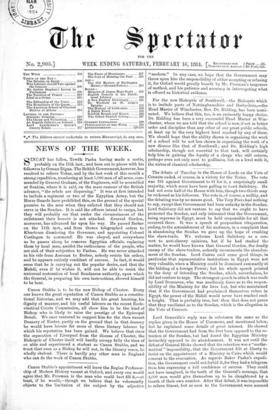The debate of Tuesday in the House of Lords on
the Vote of Censure ended, of coarse, in a victory for the Tories. The vote was 181 against Government to 81 for it, a surprisingly small majority, which must have been galling to Lord Salisbury. He had not even half of the House with him, though two-thirds may be reckoned as his followers. The vote is, of course, a nullity, and the debating was by no means good. The Tory Peers had nothing to say, except that Government had been unlucky in the Soudan. Lord Salisbury did not venture to say that we ought to have protected the Soudan, and only intimated that the Government, being supreme in Egypt, must be held responsible for all that occurred there. It was a speech of purposeless vituperation, ending, to the astonishment of his audience, in a complaint that in abandoning the Soudan we gave up the hope of crushing the slave-trade. We welcome Lord Salisbury as a con- vert to anti-slavery opinions, but if he had studied the matter, he would have known that General Gordon, the deadly enemy of the slave-traders, ardently recommends the abandon- ment of the Soudan. Lord Cairns said some good things, in particular that representative institutions in Egypt were not very valuable, when a Ministry could be dismissed summarily at the bidding of a foreign Power ; but his whole speech pointed to the duty of defending the Soudan, which, nevertheless, he did not venture to urge. The strongest speech in attack was made by Lord Dunraven, who was needlessly fierce as to the respon- sibility of the Ministry for the lives lost, but who maintained that if the Government had proclaimed themselves rulers in Egypt, the power of the Mandi would never have reached such a height. That is probably true, but then that does not prove that they vacillated as to the Soudan, which is the allegation in the Vote of Censure.


































